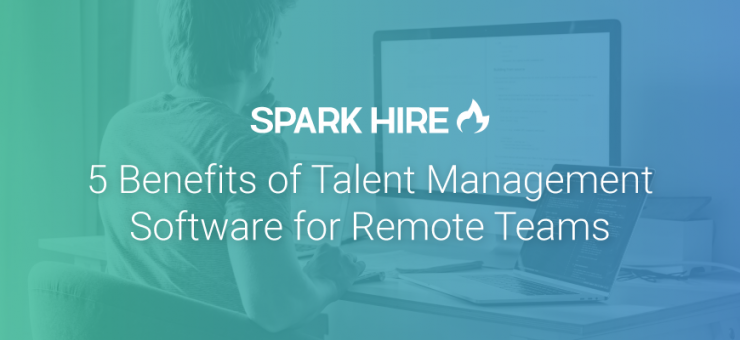Since early 2020, your organization has likely experienced a lot of change, including what the workday looks like for your employees. Nonprofits and businesses alike have migrated to hybrid or remote work models, learning how to adapt to everything from performance reviews over Zoom to post-work virtual happy hours.
In short, the COVID-19 pandemic hasn’t made anything easy, including engaging your remote employees. Plus, The Great Resignation is now rippling through the workforce, making engagement and retention even trickier. According to the Bureau of Labor Statistics, 4.3 million Americans quit their jobs in December 2021 alone.
The best way to start tackling these challenges is to evaluate your digital infrastructure. You’ll need the right tools to effectively implement sustainable remote management strategies that encourage employee engagement and retention and promote overall organizational growth. One of these essential tools is talent management software, which can help you better translate your HR processes to a remote setting.
In this post, we’ll walk through five benefits of talent management software for remote teams:
- Centralization of Your HR Data
- Support for Your Recruiting Efforts
- Increased Employee Engagement
- Better Feedback and Culture-Building
- Easier Compensation Management
Talent management software can not only help you safeguard what you’ve already built with your employees, but it can also prepare you for growth down the road. As you explore the benefits of using talent management software to manage remote teams, remember you’ll need to pick a solution that works for you. Astron Solutions’ talent management software buyers’ guide can help you explore your options.
Let’s begin!
1. Centralization of Your HR Data
The core function of talent management software is to streamline how your organization handles one or more aspects of HR. Also referred to as performance management, this area includes tasks related to supervising employee work, providing feedback, facilitating workflows, and generally defining and managing the structure of your organization.
Using dedicated software to manage these tasks gives you the immediate benefit of centralizing them. This is similar to why a business or nonprofit uses a CRM to centralize customer or donor data. With a complete record of employee engagement data, it becomes easier to identify trends or issues as they arise, and then refine your approach for the future.
For instance, do you know the most common reasons employees give for quitting their jobs at your organization? Or the professional development opportunities that your employees seek out the most? Centralized talent management software can help you answer questions like these in just a few minutes.
Features like performance management facilitation and record-keeping, exit interview questionnaires, and organizational chart creation are all great examples of what to look for in software to help you centralize your efforts.
2. Support For Your Recruiting Efforts
Talent management software can also greatly benefit your remote hiring processes. You might use a comprehensive management platform that includes integrated hiring features, or leverage your own set of separate recruiting platforms, interview software, and candidate trackers.
Either way, using a tech stack of HR software makes it easier to find the right additions to your remote team and offer them a stellar candidate experience.
Not to mention, the nature of remote work often makes it difficult to meet qualified candidates in person, so software plays the crucial role of helping you screen candidates and facilitate interviews virtually. Making the move to this virtual format will be much easier with the right software in place to support your efforts.
Plus, if you’re using a centralized talent management platform as discussed above, you can see some additional systemic benefits across your recruiting process as a whole thanks to access to a complete record of your organization’s employment data.
3. Increased Employee Engagement
When an employee is effectively engaged, they’re truly invested in their job and loyal to your organization. They take an active role in making your internal culture stronger and seize opportunities for learning and growth.
Engaging your employees begins with a successful onboarding process and continues throughout the time an employee remains in your employment. You can use your talent management software to manage and encourage employee engagement.
Here are some opportunities your organization may offer (or plan to offer in the future) that you can manage with talent management software:
- Thorough Onboarding: Onboarding can set the tone for an employee’s experience with your organization. Work to create and manage a process that involves training courses, learning from managers and senior coworkers, and positive experiences with your organization’s internal culture. This will be especially important for employees who are onboarding remotely.
- Vertical Growth: Many employees want to progress in their career through moving into a management position or another role at their organization. Your talent management software can help you organize how this process plays out for remote employees at your organization. For example, you might create an organizational chart that helps leaders visualize how every role connects to each other, or you might store data on performance reviews that can be used to determine if someone is ready for a promotion.
- Ongoing Learning: Ongoing learning opportunities, such as stretch assignments, continuing education courses, conferences and webinars, and management training can all help you better engage your employees. Employees love opportunities like these to find growth and personal fulfillment in their current roles.
As you likely know, managing onboarding, vertical growth, and ongoing learning opportunities for dozens or hundreds of individual employees can be challenging. With talent management software, you can streamline your offerings and ensure your remote employees get fair chances to take advantage of these opportunities.
4. Better Feedback and Culture-Building
Two of the most prominent functions of HR in any business are facilitating feedback and shaping the internal culture of the organization. These tasks are just as important for in-office, newly remote, and fully-remote teams, and talent management software can play a critical role in ensuring they don’t fall by the wayside for your organization.
Managing Feedback and Performance Management
Whether your organization follows a structured quarterly/bi-annual/annual structure or a more modern, continuous feedback model, using talent management software to anchor the process is a smart move. This keeps your records of reviews and conversations organized for easy access, which ultimately gives employees a fairer experience.
When working remotely or hybrid, it can be difficult for managers to point out specific wins and opportunities for each employee, but a centralized system helps address that issue. This works in both directions, too. Facilitating, recording, and acting on employee feedback is critical for strengthening your HR processes and organization as a whole.
Building a Transparent Culture
Talent management software also helps to make your remote business’s internal processes as transparent as possible.
Giving employees easy access to their own records, total rewards statements, advancement opportunities, and employee recognition gamification tools is essential. Coupled with an open, proactive approach to communication and effective video conferencing tools, you can create a culture of transparency for your business. Consider working with an HR consulting firm or expert if a big-picture strategy update sounds like a smart move for your business.
Strengthening culture can definitely be a challenge for remote teams during these unprecedented times. However, the task of managing culture and performance ultimately comes down to keeping employees engaged with your organization by reiterating the contributions and value they bring to the table, even if it’s a virtual table for the foreseeable future. Transparency, communication, and performance management processes are great ways to support that engagement.
5. Easier Compensation Management
As emphasized by Astron Solutions’ employee compensation crash course, compensation isn’t just something you can “set and forget.” Rather, effective compensation strategies require consistent management and monitoring to truly demonstrate to an employee that your organization sees and appreciates their contributions. Talent management software can help you with this, too!
Here are some tools to look for in a talent management software platform that can help with compensation management:
- Total Rewards Statements: A total rewards approach to compensation can aid you in engaging and retaining your employees. This holistic approach that includes both direct and indirect compensation is increasingly appealing to employees and can help motivate your workers to continue with your organization. Total rewards statements can empower employees to monitor their current compensation packages and to visualize how total rewards work at your organization.
- Pay for Performance Tools: Rewarding your top talent is essential for both retention and long-term organizational growth. With pay for performance tools, you can manage your merit increase budget, provide senior management with performance reports, and calculate pay increases for top performers.
- Sales Commission Tracker: A commission or incentive program can be extremely motivating for employees in a sales role. A commission tracker can help you account for each employee’s sales and calculate commissions.
Having a strong compensation strategy is critical to retaining your remote employees, especially during this time of economic uncertainty and movement in the workforce. Using your talent management solution can help you track what you’re offering your employees and how that communicates their value to your organization. Plus, as you track it consistently, you’ll be able to proactively adjust or update your approach.
Talent management software, whether a comprehensive platform or individual solutions built for specific needs, plays an important long-term role for your organization beyond its initial purpose, especially when it comes to engaging and retaining remote workers. There are more options on the market than ever to provide talent management solutions for organizations of all types and sizes, so it pays to do your research.
Strong HR processes, streamlined with talent management software, can help your organization weather the storms that come your way, whether that means continuing with a remote work format for the foreseeable future or navigating the ongoing Great Resignation. With the right tech on your side, you’ll be able to retain your employees and keep your organization moving forward.
About the Author

Jennifer C. Loftus is a Founding Partner of and National Director for Astron Solutions, a compensation consulting firm. Jennifer has 23 years of experience garnered at organizations including the Hay Group, Parsons Brinckerhoff, Eagle Electric Manufacturing Company, and Harcourt General.
Jennifer has held volunteer leadership roles with SHRM, New York City SHRM, and WorldatWork. She serves as a subject matter expert to the SHRM Learning System and as a SHRM instructor. Jennifer is a sought-after speaker for local & national conferences and media outlets.
Jennifer has an MBA in Human Resource Management with highest honors from Pace University and a BS in Accounting summa cum laude from Rutgers University.
Jennifer holds Adjunct Professor roles with Pace University, Long Island University, and LIM College.
Jennifer received the 2014 Gotham Comedy Foundation’s Lifetime Ambassador of Laughter Award.











